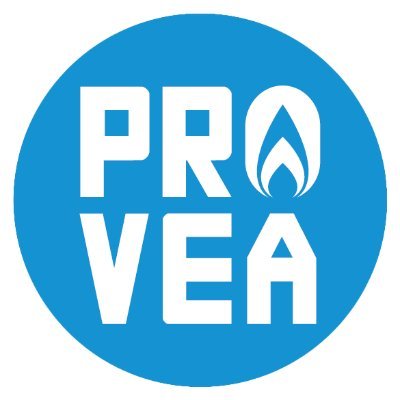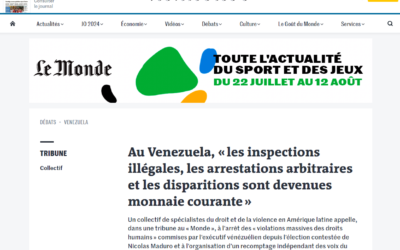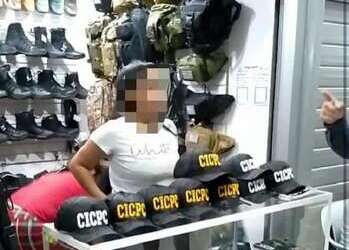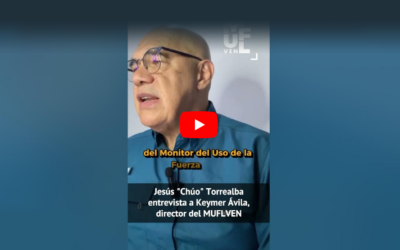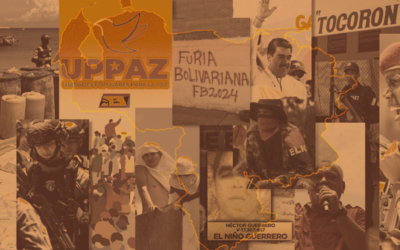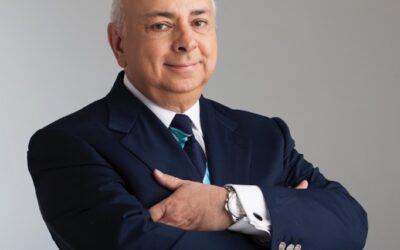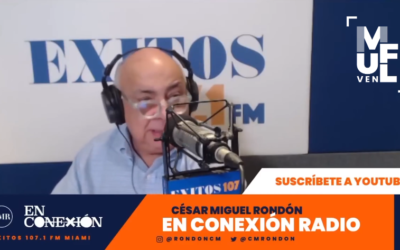1 de octubre de 2018
Luis Silva
Keymer Ávila is a lawyer, Master in Criminal Law Sociology, from the University of Barcelona. He is a researcher at the Institute of Criminal Sciences of the UCV, professor of Criminology in undergraduate and postgraduate courses (UCV) and advisor to various NGOs on citizen security and human rights.
– Since 1998 there have been various security plans. Could you characterize them? Is there any difference in the security plans that Chávez executed and those of Maduro?
Listing the different plans has been positioned a lot, it’s like a fetish. In this sense, it is necessary to highlight the difference between rhetoric and propaganda with what is a public policy. Not everything that is announced is a policy, even some actors come to identify a public policy with what is published in an official gazette, from this then what must be clarified is that this cannot be identified as a public policy. In that sense, it can be said that there have been a lot of announcements of a lot of things that they are going to do that in the end do not materialize. On the other hand, I can highlight as positive what was the Police Service Law, which is the one that tries to formalize the whole issue of police reform led by the National Commission for Police Reform (CONAREPOL), That from the point of view of designing a policy and from the regulatory point of view is very good, however, that does not apply either. What are the actors on both sides (government and opposition) saying: the policy failed, to that I reply that something that has not been implemented cannot fail. Having clarified this, I can say that what was implemented by both Chávez and Maduro, which during these twenty years can be distinguished, within the rhetoric and what was implemented, two great stages, the first goes from 1998 to 2012, for that period the most important thing was the social, in this framework for Chávez the problems of violence and insecurity were motivated by social exclusion and that the basic needs of the population were not satisfied, in this sense, the repressive policy of the so-called fourth republic was questioned. however, that does not apply either. What are the actors on both sides (government and opposition) saying: the policy failed, to that I reply that something that has not been implemented cannot fail. Having clarified this, I can say that what was implemented by both Chávez and Maduro, which during these twenty years can be distinguished, within the rhetoric and what was implemented, two great stages, the first goes from 1998 to 2012, for that period the most important thing was the social, in this framework for Chávez the problems of violence and insecurity were motivated by social exclusion and that the basic needs of the population were not satisfied, in this sense, the repressive policy of the so-called fourth republic was questioned. however, that does not apply either. What are the actors on both sides (government and opposition) saying: the policy failed, to that I reply that something that has not been implemented cannot fail. Having clarified this, I can say that what was implemented by both Chávez and Maduro, which during these twenty years can be distinguished, within the rhetoric and what was implemented, two great stages, the first goes from 1998 to 2012, for that period the most important thing was the social, in this framework for Chávez the problems of violence and insecurity were motivated by social exclusion and that the basic needs of the population were not satisfied, in this sense, the repressive policy of the so-called fourth republic was questioned. the policy failed, to that I answer that something that has not been implemented cannot fail. Having clarified this, I can say that what was implemented by both Chávez and Maduro, which during these twenty years can be distinguished, within the rhetoric and what was implemented, two great stages, the first goes from 1998 to 2012, for that period the most important thing was the social, in this framework for Chávez the problems of violence and insecurity were motivated by social exclusion and that the basic needs of the population were not satisfied, in this sense, the repressive policy of the so-called fourth republic was questioned. the policy failed, to that I answer that something that has not been implemented cannot fail. Having clarified this, I can say that what was implemented by both Chávez and Maduro, which during these twenty years can be distinguished, within the rhetoric and what was implemented, two great stages, the first goes from 1998 to 2012, for that period the most important thing was the social, in this framework for Chávez the problems of violence and insecurity were motivated by social exclusion and that the basic needs of the population were not satisfied, in this sense, the repressive policy of the so-called fourth republic was questioned.
The issue of violence and insecurity was not really taken into account until 2006, which was an election year, basically because of a position on the part of the opposition on that particular issue due to emblematic cases such as the case of the Faddoul children, months before the Kennedy case, the Sindoni case and the case of the priest Piñango, of which, by the way, three involved police officers and it was within this framework that CONAREPOL was created, as I have said previously in a discursive way because in practice Actions were launched such as the creation of the Bicentennial Citizen Security Device (DIBISE), actions such as “Madrugonazo al Hampa”. From the rise of Maduro to power, the discourse changes towards a punitive and repressive one, from that moment the arrests of a political nature increase,People’s Liberation Operation (OLP)when, according to figures from the Public Ministry for the year 2015 they increase by 69% and according to the Ministry of the Interior and Justice by 88%, for the year 2016 this ministry affirms that it increased by 131% and the Public Ministry affirms that it increased by 163%, compared to 2014, it can be seen that deaths at the hands of state security agencies tripled, all this accompanied by a more aggressive, warlike discourse, even hunting enemies whom the president qualifies as pests, curiously similar to the discourse of the so-called 4th Republic and with plans also similar to, for example, “Operation Vanguardia”, “Plan Oriente” and the “Plan Unión”, the latter, by the way, created at the end of the 80s characterized by by a political, economic and social crisis,where the government of the time wanted to legitimize itself with expressions of force, in this sense it seems that we are in an ellipsis in terms of vision of citizen security.
– If we talk about similarities, then we can name the Special Action Forces (FAES), similar to the elite corps of that time. Why and why a group like the FAES? What responsibility do the minister of the area and the national executive have in their actions?
In this sense, it is worth emphasizing two things, since the creation of the PLO, the joint actions of various state security agencies in operations are once again evident, which makes it difficult to assign subsequent responsibilities, both individual and institutional. , is the same model that was used with the so-called General Specific Command in Chief José Antonio Páez (CEJAP), which was made up of the Army, the Judicial Technical Police (PTJ) and the Division of Intelligence, Security and Prevention (DISIP). Regarding the FAES in particular, it is a specialized body dependent on the Bolivarian National Police (PNB) and is a tactical group, now you will wonder what is a tactical group? Well, they are high-impact groups with military training and are the expression of the most intense performance of a security force such as hostage rescue, confrontation with the use of long arms against irregular groups, they also have war training with psychopathic traits, by the way. The situation that has arisen with this group in particular is that they are being used to act in the daily life of citizen security, which has resulted in a high death toll.
– Insight Crime described Venezuela as the most violent country in Latin America, with a rate of 89 homicides per 100,000 inhabitants. Are these figures true?
This organization belongs to an investigative journalism group and the figure you mention is taken from the Venezuelan Violence Observatory (OVV), in this sense it must be said that the role played by this organization has been more of political pressure, why I affirm it? From 2005 to 2016 the government, in a very clumsy way in my opinion, omitted to give figures on homicides, so from that moment the OVV began to make correct estimates from a methodological point of view, but estimates nonetheless. On the other hand, this percentage does not refer only to homicides, it refers to an indicator called “violent deaths” that is made up of homicides, a category that is not legal but is counted as “resistance to authority” and the last one is deaths under investigation, which includes suicides, traffic accidents, among others. At the international level, only homicides are counted, obviously confusing these with violent deaths inflates a percentage that is already very high. Starting in 2016, the Attorney General began to give the figures, at which time, by the way, she began to distance herself from the government, announcing that there are 58 homicides for every 100,000 inhabitants and in 2017 she reported that the figure increased to 70 for every 100 thousand inhabitants, a figure that is quite alarming if we compare it with the Latin American region, which is 22, and even more alarming if we compare it with the world population, which is 6.2, the World Health Organization affirms that a figure greater than 10 should be considered as a epidemic. By December 2017, with the prosecutor already out of office, the interior minister,After reviewing their data, we can affirm that the figure according to official data is 62 homicides per 100,000 inhabitants . However, this figure must be analyzed taking into account that it is based on a population estimated in the 2010 census without considering the enormous migration that has taken place in recent years; additionally, in 2017 it should be noted that as a result of the protests the country was almost paralyzed for four months, which shows that this decrease compared to 2016 does not affect the general trend of increasing homicide rates.
– According to the latest figures published by the Public Ministry in 2016, 86.6% of homicides were committed by firearms. What is this particularity due to?
We are above international standards in this matter and the initial explanation is that access to firearms is very easy in the country. The ammunition used or linked to homicides is produced by the Venezuelan state through the Compañía Anónima Venezolana de Industrias Militares (CAVIM), which demonstrates a lack of control of the state’s arms monopoly, even evidenced in an investigation on the vulnerability of police officers killed by homicides that 10% of these deaths were caused by the use of firearms of an organic nature, that is, weapons owned by the state. Even in a work by Andrés Antillano on the subject, the responses of criminal groups to the question where did they get their weapons? They responded that the police officers and the military themselves sold them, the problem then is that the police and military forces themselves are in the arms and ammunition business.
– Apparently there is a lack of effective mechanisms that register, track and control weapons and ammunition, among which is the surveillance and audit of warehouses and parks. Could this be considered something premeditated by the state?
Creo que es algo más complejo, a pesar del cambio de actores políticos de la llamada 4ª República, a pesar del cambio discursivo, incluso del pretendido cambio ideológico, ha habido una continuidad en la precariedad institucional y una continuidad en la “autonomización” del aparato policial y militar, los cuales en definitiva tienen su propia agenda, pueden tener algunas relaciones coyunturales funcionales con quien esté en el poder, pero el poder político no los controla, más bien pareciera que estamos en una etapa donde estos aparatos controlan al poder político. El quid del asunto se resume en un interés crematístico de carácter privado entre ambos actores.
– Based on that statement, how are the security organizations in the country structured?
From the formal point of view it is a pyramidal structure and in this structure there are different levels: national, state and municipal. So we have that what refers to the Armed Forces depends on the national executive, likewise the national civilian police forces such as the Bolivarian National Police (PNB), the Scientific, Penal and Criminal Investigations Corps (CICPC) that for at least 40 years It is the security body that commits the most homicides and that, paradoxically, is the one that is in charge after investigating them. Bolivarian Intelligence Agency (SEBIN) which also, although it does not have among its powers to do so, carries out citizen security tasks and lastly, we have the Directorate of Military Counterintelligence (DGCIM) which also, although it is not its competence, carries out police work. At the state level there are the state police that answer to the governor of the respective state and the municipal police that report to the mayor of their jurisdiction.
– However, as you have commented and as has been seen, they apparently act autonomously, as in the case of SEBIN, which does not comply with court orders, for example, and even though the detainee has a release or release order, this body refuses in practice to carry out those orders.
There, obviously, it is a political matter and we would enter the speculative field due to the complexities of each case, where a prisoner is detained by order of a particular official and that body then responds to that official. It can also be highlighted that despite being an intelligence body, it has detainees for cases of common crimes, including drug trafficking, and that even harms one’s own body, because it enters a field of corruption, where one begins to enter the dynamics of the collection of bribes to release prisoners, to supply them with food, medicine, among others. The same occurs with security forces attached to the Armed Forces in police work. When the security forces are allowed so much power, that in principle they do not answer for executions,
– Apparently the Venezuelan state is a repeat offender in impunity, especially in the case of extrajudicial executions, not now but historically, why is that?
Impunity is the norm in the countries of the region, it is not something exclusive to Venezuela, citing Christie we have that if the state complied with what the norm says to the letter, we would all end up in prison and with a totally militarized society. In this sense, it must be said that the penal system is characterized by being selective, so in the end, who does it select? To the most vulnerable, to the least powerful and through that selection it legitimizes itself. Due to its characteristics, this system must be managed in the best way and be reserved for the most serious cases, such as homicides. So when you talk about impunity, which is also a very conservative slogan depending on the context, you can’t talk about impunity in general because when you see the incarceration rates, these have also skyrocketed. Speaking of the penitentiary system, without including those incarcerated in police stations who die of tuberculosis, who die as a result of overcrowding, who die from starvation, then it is being punished much more than before, what happens is that minor crimes are punished, the punishment for crimes of Homicide barely reaches 20% of the total number of detainees and those detained for rape do not reach 1%. Those who commit serious crimes do not go to jail, those who have less power to claim social rights go. It can be said that impunity, in the case of common homicides, is approximately 90% and this figure rises even higher in the case of homicides committed by police officers. so it is being punished much more than before, what happens is that minor crimes are punished, the punishment for crimes of homicide barely reaches 20% of the total number of detainees and those detained for rape do not reach 1%, they do not go to jail Those who commit serious crimes go to those who have less power to claim socially. It can be said that impunity, in the case of common homicides, is approximately 90% and this figure rises even higher in the case of homicides committed by police officers. so it is being punished much more than before, what happens is that minor crimes are punished, the punishment for crimes of homicide barely reaches 20% of the total number of detainees and those detained for rape do not reach 1%, they do not go to jail Those who commit serious crimes go to those who have less power to claim socially. It can be said that impunity, in the case of common homicides, is approximately 90% and this figure rises even higher in the case of homicides committed by police officers.
– Does the high lethality of police action have a greater purpose than just causing casualties of suspected criminals?
When that subject is touched on, I use a classical sociologist named Merton, who speaks of manifest functions and latent functions. The manifest ones are those easily observable in the analysis, they are recognized by and contribute to the maintenance of the system, the latent ones are not easily seen, they are underlying, they are not always recognized or desired by the system. So in this manifest logic of dripping massacre, it appears as a fight against evil, to defend decent people from the dregs of society, the latent ones are many, first of all, to send an authoritarian message of power over life and death without any consequence, there the institutional limits, the legal limits vanish. If we talk about the autonomization that we mentioned previously,
– What should be, according to your criteria, a security policy on the part of the Venezuelan state?
The first thing is that there are no magic recipes. If someone says that he has it, you have to run away. Already in history there was someone who said that he had the “final solution” and we already know how it ended. The issue of security must be evaluated from the perspective of complexity, especially knowing that it is the consequence of a host of social and institutional problems.
The first thing is to investigate and make concrete diagnoses, any public policy must be based on data and true information; Second, the armed apparatus of the state must be controlled and supervised. Politicians must control the police and the military and not the other way around; third, intelligence has to be above force, criminal intelligence work is surgical, it is not so expensive and it does not imply a large display of force with the collateral damage that this implies, there is no mafia and organized crime without some kind of support from the state apparatus; What follows is to lower the number of homicides and this involves finding the main culprits, starting with those with the highest number of accumulated cases and the institutions have to concentrate on it. A security policy has three elements: prevention, control and repression, the important thing is that they all have rationality; fifthly, the regulation and control of arms and ammunition has to be a priority on the part of the state, it is not a matter of speeches, not a silly disarmament propaganda, it has to be part of a real policy; The justice system must be thoroughly revised, in this sense, to be a magistrate or judge, apart from having the necessary academic and technical credentials, you must also have the moral solvency to do so, it cannot be that at the head of the judiciary there are people with criminal record; The other thing is not to reduce the complexity of the security problem to the legislative field, the security problem is not solved with official gazettes or with pieces of paper, it is solved with political will, with institutional strengthening, regardless of the institutions that make up the justice administration system; you have to make rational use of the penal system and not use it for everything, it should be to intervene in the most serious and specific cases.
These actions must be interpreted in their fair measure, I am not talking here about the state ceasing to intervene, but rather that it do so in a timely and efficient manner when the conflict occurs and it must always seek the protection of the weakest, there must be a minimum institutionality that solves and does not increase the problems and, finally, the role of the social state is fundamental, the satisfaction of the basic needs of the population: food, health and education, cannot be expected to replace the social state by the penal and repressive state.
Publicado originalmente en: Provea
